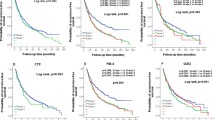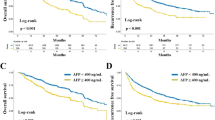Abstract
Background
Several scoring systems are currently used to predict prognosis of hepatocellular carcinoma (HCC), but none of them integrates liver function, systemic inflammation, and tumor characteristics in a unified model. The current study aimed to develop and validate a novel prognostic score that integrates liver function, systemic inflammation, and tumor characteristics in a unified model to predict the prognosis of HCC after curative resection.
Methods
Patients with HCC who underwent curative liver resection were included in a training set (n = 1027). Multivariate Cox regression was performed to determine the risk factors for a poor prognosis. A prognostic score was developed by assigning points for risk factors in proportion to beta coefficients in a Cox multivariable model. Predictive performance and distinction ability of the prognostic score were further evaluated in two independent validation cohorts treated with either curative resection (n = 281) or transarterial chemoembolization (TACE) (n = 404) and compared with 16 other models.
Results
The prognostic predictive system, named the function-inflammation-burden-alpha-fetoprotein (FIBA) score, was derived by assigning points for six independent predictors including albumin, total bilirubin, lymphocyte count, diameter of the largest tumor, number of tumors, and alpha-fetoprotein (AFP). The FIBA score showed an outperformed predictive value compared with other systems in both training and validation cohorts by giving the highest C-index, likelihood ratio chi-square values, and Wald test values as well as the lowest Akaike information criterion.
Conclusion
The FIBA score can be used to stratify HCC patients treated with curative resection. Meanwhile, the FIBA score performs well against other prognostic scoring systems and is potentially broadly applicable to a TACE-treated patient cohort.



Similar content being viewed by others
References
Llovet JM, Kelley RK, Villanueva A, et al. Hepatocellular carcinoma. Nat Rev Dis Primers. 2021;7:6.
European Assoc Study Liver. EASL Clinical Practice Guidelines: management of hepatocellular carcinoma. J Hepatol. 2018;69:182–236.
Heimbach JK, Kulik LM, Finn RS, et al. AASLD guidelines for the treatment of hepatocellular carcinoma. Hepatology. 2018;67:358–80.
Johnson PJ, Berhane S, Kagebayashi C, et al. Assessment of liver function in patients with hepatocellular carcinoma: a new evidence-based approach-the ALBI grade. J Clin Oncol. 2015;33:550–8.
Kok B, Abraldes JG. Child-Pugh classification: Time to abandon? Semin Liver Dis. 2019;39:96–103.
Kamath PS, Wiesner RH, Malinchoc M, et al. A model to predict survival in patients with end-stage liver disease. Hepatology. 2001;33:464–70.
Hu B, Yang XR, Xu Y, et al. Systemic immune-inflammation index predicts prognosis of patients after curative resection for hepatocellular carcinoma. Clin Cancer Res. 2014;20:6212–22.
Chen Y, Yang Y, Zhang XY, et al. Nomogram based on neutrophil-to-lymphocyte ratio and platelet-to-lymphocyte ratio to predict recurrence in patients with hepatocellular carcinoma after radiofrequency ablation. Cardiovasc Inter Rad. 2021;44:1551–60.
Abdel-Rahman O. Assessment of the discriminating value of the 8th AJCC stage grouping for hepatocellular carcinoma. HPB. 2018;20:41–8.
Kadalayil L, Benini R, Pallan L, et al. A simple prognostic scoring system for patients receiving transarterial embolisation for hepatocellular cancer. Ann Oncol. 2013;24:2565–70.
Reig M, Forner A, Rimola J, et al. BCLC strategy for prognosis prediction and treatment recommendation: the 2022 update. J Hepatol. 2022;76:681–93.
Okuda K, Ohtsuki T, Obata H, et al. Natural history of hepatocellular carcinoma and prognosis in relation to treatment study of 850 patients. Cancer. 1985;56:918–28.
Mazzaferro V, Llovet JM, Miceli R, et al. Predicting survival after liver transplantation in patients with hepatocellular carcinoma beyond the Milan criteria: a retrospective, exploratory analysis. Lancet Oncol. 2009;10:35–43.
Wang QH, Xia DD, Bai W, et al. Development of a prognostic score for recommended TACE candidates with hepatocellular carcinoma: a multicentre observational study. J Hepatol. 2019;70:893–903.
Farinati F, Vitale A, Spolverato G, et al. Development and validation of a new prognostic system for patients with hepatocellular carcinoma. Plos Med. 2016;13:e1002006.
Manghisi G, Elba S, Mossa A, et al. A new prognostic system for hepatocellular carcinoma: a retrospective study of 435 patients. Hepatology. 1998;28:751–5.
Kudo M, Chung HB, Osaki Y. Prognostic staging system for hepatocellular carcinoma (CLIP score): its value and limitations, and a proposal for a new staging system, the Japan Integrated Staging Score (JIS score). J Gastroenterol. 2003;38:207–15.
Hiraoka A, Kumada T, Michitaka K, et al. Usefulness of albumin-bilirubin grade for evaluation of prognosis of 2584 Japanese patients with hepatocellular carcinoma. J Gastroenterol Hepatol. 2016;31:1031–6.
Heagerty PJ, Zheng YY. Survival model predictive accuracy and ROC curves. Biometrics. 2005;61:92–105.
Demirtas CO, Ricco G, Ozdogan OC, et al. Proposal and validation of a novel scoring system for hepatocellular carcinomas beyond curability borders. Hepatol Commun. 2021;6:633–45.
Mao SQ, Yu X, Shan YY, Fan R, Wu SD, Lu CD. Albumin-bilirubin (ALBI) and monocyte-to-lymphocyte ratio (MLR)-based nomogram model to predict tumor recurrence of AFP-negative hepatocellular carcinoma. J Hepatocell Carcinoma. 2021;8:1355–65.
Vogel A, Frenette C, Sung M, et al. Baseline liver function and subsequent outcomes in the phase 3 REFLECT study of patients with unresectable hepatocellular carcinoma. Liver Cancer. 2021;10:510–21.
Cucchetti A, Sposito C, Pinna AD, et al. Competing risk analysis on outcome after hepatic resection of hepatocellular carcinoma in cirrhotic patients. World J Gastroenterol. 2017;23:1469–76.
Tsilimigras DI, Hyer JM, Diaz A, et al. Synergistic impact of alpha-fetoprotein and tumor burden on long-term outcomes following curative-intent resection of hepatocellular carcinoma. Cancer. 2021;13:4.
Mueller L, Hahn F, Auer TA, et al. Tumor burden in patients with hepatocellular carcinoma undergoing transarterial chemoembolization: head-to-head comparison of current scoring systems. Front Oncol. 2022;12:850454.
Dupre A, Malik HZ. Inflammation and cancer: what a surgical oncologist should know. EJSO. 2018;44:566–70.
Chan SL, Wong LL, Chan KCA, et al. Development of a novel inflammation-based index for hepatocellular carcinoma. Liver Cancer. 2020;9:167–81.
Yu MQ, An TZ, Li JX, Chang DH, Zhang ZS, Xiao YD. Integrated liver inflammatory score predicts the therapeutic outcome of patients with hepatocellular carcinoma after transarterial chemoembolization. J Vasc Interv Radiol. 2021;32:1194–202.
Yau T, Tang VYF, Yao TJ, Fan ST, Lo CM, Poon RTP. Development of Hong Kong Liver Cancer Staging System with treatment stratification for patients with hepatocellular carcinoma. Gastroenterology. 2014;146:1691–700.
Pelizzaro F, Haxhi S, Penzo B, et al. Transarterial chemoembolization for hepatocellular carcinoma in clinical practice: temporal trends and survival outcomes of an iterative treatment. Front Oncol. 2022;12:822507.
Anwanwan D, Singh SK, Singh S, Saikam V, Singh R. Challenges in liver cancer and possible treatment approaches. Bba-Rev Cancer. 2020;1873:188314.
Author information
Authors and Affiliations
Corresponding author
Ethics declarations
Disclosures
There are no conflicts of interest.
Additional information
Publisher's Note
Springer Nature remains neutral with regard to jurisdictional claims in published maps and institutional affiliations.
Supplementary Information
Below is the link to the electronic supplementary material.
10434_2022_12899_MOESM2_ESM.pdf
Supplementary Fig. S1 The C-index for different scoring and staging systems for the (A) training cohort, (B) Validation-1 cohort, and (C) Validation-2 cohort (PDF 375 KB)
Rights and permissions
Springer Nature or its licensor (e.g. a society or other partner) holds exclusive rights to this article under a publishing agreement with the author(s) or other rightsholder(s); author self-archiving of the accepted manuscript version of this article is solely governed by the terms of such publishing agreement and applicable law.
About this article
Cite this article
Tong, Y., Li, JX., Chang, DH. et al. An Integrated Liver Function, Systemic Inflammation, and Tumor Characteristic Score Predicts Prognosis in Hepatocellular Carcinoma After Curative Resection. Ann Surg Oncol 30, 2007–2020 (2023). https://doi.org/10.1245/s10434-022-12899-x
Received:
Accepted:
Published:
Issue Date:
DOI: https://doi.org/10.1245/s10434-022-12899-x




